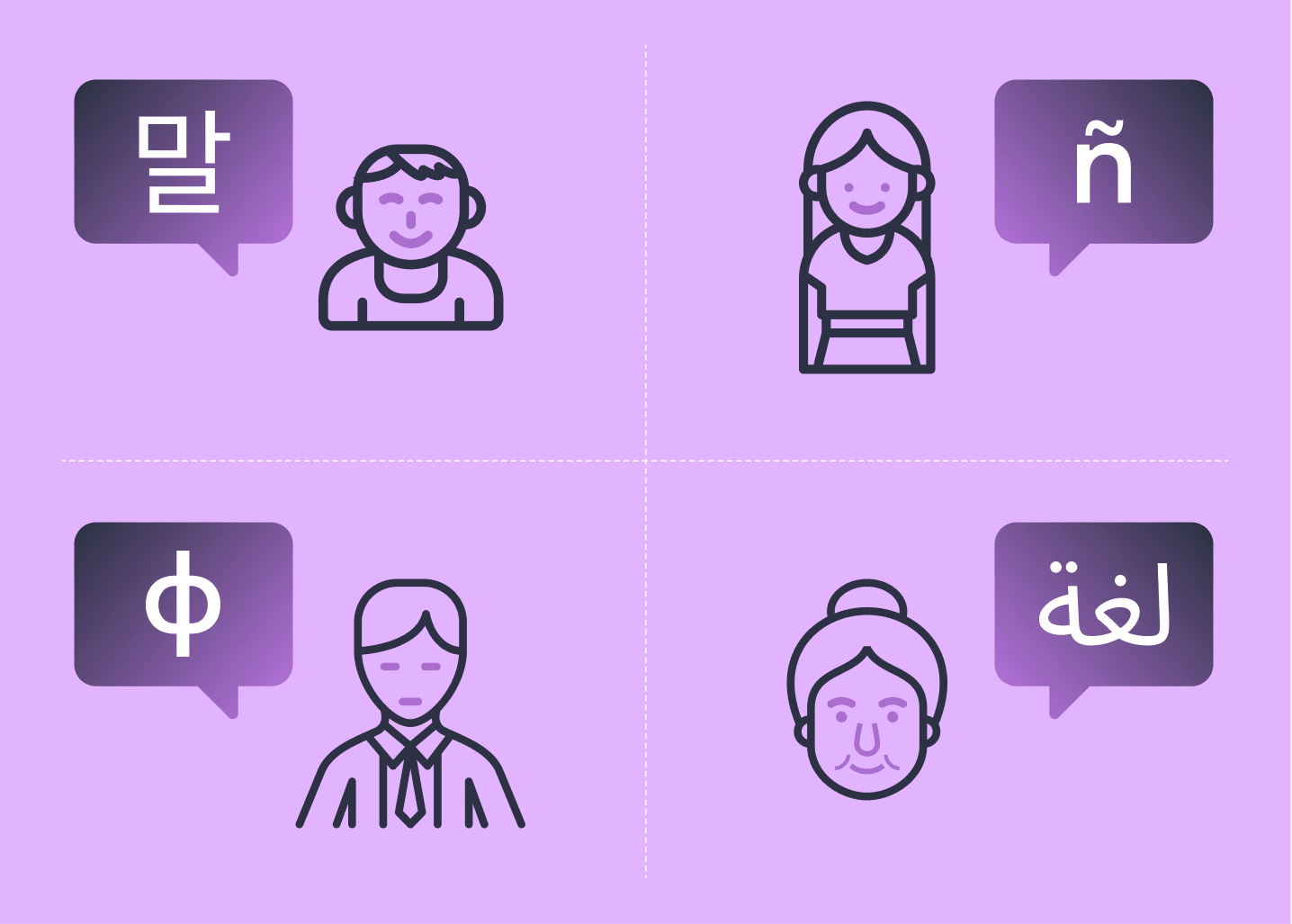The English language continues to travel the world, diversifying from its roots as it finds homes on virtually every continent.
We’ll take a whirlwind, worldwide tour of English across the globe, discovering how English varies from place to place. We’ll consider both the influence of indigenous languages on local English usage and the loanwords that have enriched the English lexicon. We’ll also examine the incorporation of the language’s most-used standards, British and American English, into language varieties such as regional dialects, pidgins, and creoles.
Worldwide English commonalities
Currently, English is spoken as a majority native language in nineteen countries. In the many countries where English is not a majority language, it often facilitates business and government communications among diverse groups. Standard English is also a language of education and opportunity in many of these countries.
Intermixing with indigenous languages, English becomes the basis for pidgins, creoles, and other forms of patois for use in everyday life.
English as a world traveler
Loanwords and phrasings from indigenous languages throughout the world have added diversity and flavor to English. At the same time, newer English varieties reflect some usages and expressions that are now obsolete in standard English.
Global English accents
Like a time capsule, vestiges of English accents from centuries ago remain in many global varieties of English. Older English vowel pronunciations can provide clues as to when English became part of a locality’s linguistic landscape. The way the letter R is pronounced can often indicate whether someone is speaking British or American English.
Several extensive audio collections of English words, phrases, and sample texts illustrate how accents vary throughout the English-speaking world:
- Forvo
- The British Library’s Accents & Dialects archive
- International Dialects of English Archive (IDEA)
- The Speech Accent Archive at George Mason University
Dialects of British and Irish English
The islands of Great Britain and Ireland are jam-packed with a wide variety of English idioms, accents, and usage.
From the Liverpudlian lilt popularized by the Beatles to the Queen’s English, England itself boasts dozens of different regional accents. Cornwall, Wales, Scotland, the Isle of Man, and Ireland all used other languages before English came into the picture. With the exception of Lowland Scots, a language closely related to English, these indigenous languages primarily belong to the Celtic family.
British and Irish English: Accents, literature, and media
| Country or Region | Major Indigenous language(s) | Accent samples | Dialects in literature and media |
|---|---|---|---|
| England | English | English dialect speech samples, by region | Literature of the United Kingdom (general and regional) |
| England | English | Assorted English accents and Received Pronunciation | |
| Cornwall | Kernewek | Cornish English speech samples | List of books set in Cornwal |
| Cornwall | Kernewek | Cornish English speech samples | Doc Martin (TV show) |
| Wales | Cymraeg | Welsh English speech samples | List of Welsh books |
| Scotland | Scots Gaelic / Lowland Scots | Scottish English speech samples | List of Scottish writers |
| Isle of Man | Manx Gailck (or Gaelg) | Poetry excerpt / Ronague native / Andreas native | Compendium of Manx literature |
| Ireland | Irish Gaelic | Irish English speech samples | List of Irish books |
| Ulster / Northern Ireland | Ulster dialect of Irish Gaelic | Ulster English speech samples | List of Northern Irish writers / Derry Girls (TV show) |
English regional, British, and Irish English expressions
| Word or expression | Meaning in standard English | Origin (with links to additional expressions) |
|---|---|---|
| grockle | tourist; out-of-towner | County Somerset |
| dutty | scummy, disgusting, or dirty | Essex |
| kegs / keks | trousers | Yorkshire |
| tot | alcoholic beverage | Brummie (Birmingham) |
| drecky | occurring within an indeterminate amount of time | Cornwall |
| poppy ping | microwave oven | Wales |
| sitooterie | secluded alcove for sitting privately (within a building) | Scotland |
| skeet | gossip, news; a quick look | Isle of Man |
| shift | kiss | Ireland |
| pokie / poke | ice cream cone | Ulster / Northern Ireland |
Additional glossaries
Dialects of Caribbean English
Dating back to the 17th century, many of the Caribbean English dialects are based on British English, with some influence from French, Portuguese, Spanish, and West African languages.
Caribbean English from Puerto Rico and the US Virgin Islands (namely St. Croix, St. Thomas, and St. John) is more American flavored.
Examples of Caribbean English
| Accent samples | Media | Expressions and slang |
|---|---|---|
| Trinidad and Tobago | Caribbean Literature | pompasetting - showing off [Barbados] |
| Puerto Rico | Caribbean news outlets | flassing - ostentatious spending [Jamaica] |
| Barbados | switcha - lemonade [Bahamas] | |
| St. Lucia | jam-cram - overly crowded [Trinidad and Tobago] | |
| Jamaica | English words originating in the Caribbean | |
| St. Thomas | ||
| The Bahamas | ||
| Virgin Islands |
Dialects of American English – US & Canada
Due to both history and geographical closeness, many native English speakers from Canada and the northern United States have a somewhat similar accent. However, there aredefinite pronunciation and vocabulary differences between English as spoken in Canada and the United States.
United States
There are over two dozen dialects in the United States; some of the most prominent include:
| Accent Samples |
|---|
| American English speech samples |
| North American English speech samples |
| WIRED’s video series on North American English accents: |
| Part One – East Coast and African-American English accents |
| Part Two – American Southern and Northern states; various Spanish accents in the US |
| Part Three – West Coast of the US; US-Canadian border areas |
| American Dialects in Literature |
|---|
| Larry McMurtry [Texas] |
| Tony Hillerman [New Mexico/Southwest] |
| Langston Hughes [Harlem, New York; Chicago; African-American] |
| Stephen King [Maine] |
| Gwendolyn Brooks [Chicago; African-American] |
| Harper Lee [Alabama] |
Regional American English Expressions
| South | Midwest | Mid-Atlantic / Northeast | West |
|---|---|---|---|
| fixin’ to… – preparing to (do something) | bubbler – water fountain [also in New England] | downee ocean [Maryland] / down the shore [Philadelphia and New Jersey] – down to the beach | the breakup – springtime thaw [Alaska] |
| cattywampus – askew; on the diagonal | hotdish – casserole | long sweetening – maple syrup [Appalachian Mountains] | lanai – a patio with a roof [Hawaii] |
| lagniappe – an often unexpected bonus or extra quantities of something good [Louisiana Cajun] | tough tomatoes – tough luck | wicked – extremely [New England] | spendy – expensive [Pacific Northwest; sometimes Midwest] |
| puppy chow – sweet snack mix made with crunchy cereal | hella – extremely [Northern California] |
Canada
Canada’s dialect groups can be categorized as Atlantic (including Newfoundland), Central and Western (including the Pacific Northwest and Ottawa), Québec, and First Nations English.
Canadian English expressions
- bunny-hug – hooded sweatshirt [Saskatchewan]
- blonde – girlfriend [Québec]
- two-four – a case of two dozen beers (totaling 24, or “2-4”).
- Vancouver Special – a house without a basement, in which the first floor is often rented out
- Chesterfield – couch or sofa (from older British English)
- washroom – public toilet facilities (from the obsolete American English term)
Examples of Canadian English Accents
Although Canadian accents in English can be similar to accents from the United States, there are certain hallmarks that are considered typically Canadian.
For example, Canadian “about” sounds a bit like “aboot” to American ears. When a Canadian English speaker apologizes, the word “sorry” can sound somewhat like “sore-y.” Canadians also tend more towards typical British pronunciations on words like “civilization.”
Listening to Canadian English accents by province can give you a better idea of the differences and similarities between them. Reading Canadian English literature from different provinces is a great way to feast on the wide variety of Canadian colloquialisms.
Dialects of Fiji, New Zealand, and Australian English
English is widely spoken in the South Pacific, serving as the primary language of both Australia and New Zealand.
Australia
Australian English dialects are divided into Cultivated, Broad, and General. General Australian is the language heard in TV shows and movies, spoken by actors such as Eric Bana and Hugh Jackman.
Also called “Strine,” Broad Australian is the more stereotypical Australian accent. It was popularized by Crocodile Dundee star Paul Hogan, as well as “Crocodile Hunter” Steve Irwin. Actors Geoffrey Rush and Cate Blanchett speak Cultivated Australian, which might be considered more neutral-sounding.
Indigenous peoples of Australia tend to use Australian Aboriginal English. This differs from Standard Australian and includes many terms derived from their ancestral languages, such as yakka (work) and yabber (incessant talking). Australian Aboriginal English tends to use more of a standard American-sounding R in words like “farmer.” The auxiliary verb is often dropped, leading to phrases like, “He sleeping” or “they walking.”
Australian colloquialisms include coldie (beer), oldies (parents), and Technicolor yawn (vomit) – and, even a bit of rhyming slang, with hit the frog and toad for “hit the road.”
New Zealand
In New Zealand – also known as Aotearoa – English is one of two official spoken languages, side-\ by side with the indigenous Māori tongue. Over 95% of New Zealanders speak English. Their accent is quite distinct, even as compared to their neighbors in Australia.
New Zealanders often use “uptalk,” or a rising inflection at the end of sentences that sounds like a question is being asked. With the exception of the Southland accent, New Zealand accents are fairly uniform.
In New Zealand slang, the natives are kiwis, they wear jandals (flip-flops) on the beach, and they get angry by packing a sad. New Zealand writers often incorporate these Kiwi dialect terms into their work.
Fiji
Standard English, along with Fiji Hindi and indigenous language Fijian, is an official language of the Fiji islands. English is used throughout tourist centers and more populated areas of Fiji, where the natives regularly speak it as a second language. Visitors to Fiji might be greeted with Bula! and experience the timelessness of Fiji time.
Dialects of West African English
Most formal West African English dialects, such those in Gambia, Nigeria, Ghana, Sierra Leone, and Cameroon, are based on British English. The notable exception is Liberian English, which has American roots.
| Accent samples | Major Indigenous Languages | Literature | Expressions and slang (mostly Nigerian) |
|---|---|---|---|
| Ghana | Hausa | Ishmael Beah [Sierra Leone] | send-forth – a celebratory send-off |
| Cameroon | Igbo | Chinua Achebe [Nigeria] | barbing salon – barber shop |
| Liberia | Yoruba | West African English books | mama put – a street food vendor |
| Nigeria | Mandinka | ember months – September, October, November, and December | |
| Sierra Leone | Asante Twi | ||
| Mende | |||
| Temne |
Dialects of East African English
Primarily British-style English is used in Egypt, Sudan, Uganda, Kenya, Tanzania, and Malawi.
| Accent samples | Major Indigenous Languages | Literature | Expressions and slang |
|---|---|---|---|
| Tanzania | Arabic [Sudan & Egypt] | Grace Ogot; Meja Mwangi [Kenya] | deskmate – a student who sits next to another student in school |
| Sudan | Chewa [Malawi] | John Ruganda [Uganda] | biting – a snack [Kenyan English] |
| Kenya | Swahili [Tanzania, Uganda & Kenya] | Nuruddin Farah [Somalia] | hakuna matata – no worries; no problem [Swahili] |
| Somalia | Jamal Mahjoub [Sudan] | jiko – a wood-burning stove [Swahili] | |
| List of East African expressions in the Oxford English Dictionary |
Dialects of Southern African English
The English dialects in Zambia, Zimbabwe, Botswana, Eswatini (formerly Swaziland), Lesotho, Malawi, Namibia, Sierra Leone, and South Africa developed from British English. By population, the largest number of English speakers in the region are in South Africa, Zimbabwe, and Sierra Leone.
| Accent samples | Major Indigenous Languages | Literature | Expressions and slang |
|---|---|---|---|
| Eswatini | Bemba | Bessie Head [South Africa; Botswana] | chommie – friend, chum [South Africa] |
| Malawi | Chewa | Books by South African authors | slap chips – greasy, limp French fries [South Africa] |
| Namibia | Herero | NoViolet Bulawayo [Zimbabwe]; List of books set in Zimbabwe | den – home [Zimbabwe] |
| South Africa | Setswana | — | barley – respected father or older man [Zimbabwe] |
| Zambia | Sesotho | — | robot – traffic lights [Namibia] |
| Zimbabwe | Tumbuka | — | — |
| — | Xitsonga | — | — |
| — | Zulu | — | — |
Dialects of Southeast Asian and Indian English
English has a presence in both East and South Asia, producing several unique varieties among second-language speakers.
South Asian English
Outside the Indian subcontinent, Singapore and the Philippines have some of the largest groups of English speakers in South Asia.
| Accent samples | Other Major Languages | Literature and Press | Expressions and slang |
|---|---|---|---|
| Singapore | Chinese, Malay; Tamil [Singapore] | Books by Singaporean authors; The Straits Times; Today [Singapore] | auntie / uncle – respectful address for any older person (including a parent’s sibling) |
| Malaysia | Tagalog; Cebuano; Ilocano; Hiligaynon [Philippines] | Brunei Times and Borneo Bulletin [Brunei] | chicken feed – an easy task [Singapore] |
| Myanmar | Malay; Chinese; Arabic [Brunei] | List of Myanmar newspapers (some are bilingual, Burmese-English) | spare part – auxiliary girlfriend [Brunei] |
| Brunei | — | The Kathmandu Post [Nepal] | platform – sidewalk / pavement [Myanmar] |
| The Philippines | — | Books by Filipino writers in English; list of Philippine newspapers | high blood – agitated, upset [Philippines] |
Indian English
The Indian subcontinent is home to a diverse group of people who speak about 450 distinct native languages.
India uses British-based Indian English as a common means of communication. It’s one of the largest English-speaking countries in the world by sheer number of speakers, but only about 10% of Indians speak English.
Pakistan and Bangladesh speak English varieties based on Indian English. About half the Pakistani population speaks some English, although English proficiency in the country is not rated highly. English is sometimes considered a foreign language in Bangladesh, rather than a second language.
| Accent samples | Major Indigenous Languages | Literature & Press | Expressions and slang |
|---|---|---|---|
| India; Mumbai | Hindi, Tamil, Marathi, Telegu [India] | India: R. K. Narayan; Salman Rushdie; Arundhati Roy | timepass – something done to kill time [[India]]9https://public.oed.com/world-englishes/indian-english/) |
| Pakistan | Punjabi, Pashto, Sindhi, Saraiki [Pakistan] | Pakistan: Kamila Shamsie; Mohsin Hamid; Musharraf Ali Farooqi; List of English newspapers in Pakistan | mugging – hard-core studying; cramming [India] |
| Bangladesh | Bengali [Bangladesh] | Bangladesh: Bangladeshi English books; survey of Bangaldeshi English literature; English-language newspapers in Bangladesh | burger bacha – an out-of-touch, nerdy person; a dweeb; a poseur [Pakistan] |
| chill maro – calm down; chill out [Pakistan] |
East Asia
In Hong Kong, English is spoken as a second language by about 3.5 million people, or half of the population. However, the grammar and vocabulary of Hong Kong English are strongly influenced by the city’s native Cantonese language, as well as some Portuguese.
Although English is taught in South Korean schools, the language has not been widely adopted there.
| Accent samples | Press | Expressions and slang [Hong Kong] |
|---|---|---|
| Hong Kong | South China Morning Post | add oil – keep it up; good luck |
| — | The Standard | you’re the goodest – you’re the best |
| — | — | chop – seal or stamp of a company |
| — | — | godown – warehouse |
English as an urban international lingua franca
Most people who use English as a lingua franca (ELF) will not be native English speakers. ELF is often used as a common language by groups of people with no other language in common.
To avoid confusion and keep communication clear, colloquialisms and idiomatic expressions are kept to a minimum in ELF. Like speakers of pidgin Englishes, ELF speakers tend to simplify grammar, not focusing on exacting standards of correctness. Their goal is to convey information unambiguously.
ELF is different than business English, which generally conforms to a native-level British or American standard. ELF distills English down to language’s most essential task: sheer communication.
Unlike the world Englishes we’ve looked at, which are tied to specific places and groups of people, ELF does not refer exclusively to a single variety of English. Even so, the English standards in particular parts of the world might influence how ELF is used.
European varieties
British involvement in Malta, Cyprus, Gibraltar, and other areas in the Mediterranean helped bring the English language to the European continent. The historical role of English in the European Union government, as well as its usefulness in catering to British, Irish, American, and Australian tourists, further cemented the place of English in continental Europe.
Euro-English is becoming increasingly useful as a lingua franca in Europe, even as it pulls further away from its British roots and American influences.
Singapore & Hong Kong varieties
The prevalence of English in both Singapore and Hong Kong means that ELF in Asia is largely based upon these varieties of English, which incorporate Cantonese and Malasian vocabulary and grammar.
Other hybrid languages, creoles, and pidgins based on English
Naturally enough, many English hybrids, pidgins, and creoles have arisen over the years since English first became a world traveler. Here are but a few of them:
- Africa: Uglish; Sheng; Ghanian Pidgin English; Kamtok; Pichi; Krio; Nigerian Pidgin; Camfranglais
- East Asia: Chinese Pidgin English (historical); Konglish
- South Asia: Singlish;Taglish; Hinglish
- South and Central Pacific: Kriol;Bislama;Tok Pisin; Torres Strait Creole; Norf’k; Nauruan Pidgin English (based on Chinese Pidgin English)
- Europe: Llanito
- North America: Gullah/Geechee; Spanglish; Hawai’i Creole; Cajun English;Chiac
- Central America: Nicaraguan Creole English; Belizean Creole
- South America: Guyanese Creolese; Saramaccan; Sranan
- Caribbean:Jamaican Patwah; Bahamian Creole; Bajan; San Andres Creole English
English linguistic variation is enormous
Variations on British and American English standards are found in Europe, Africa, and Asia, as well as remote places like Pitcairn Island and the Federated States of Micronesia.
Enhanced by an astonishing variety of expression and continually adapting to its speakers’ needs, English is a global language of poetry and practicality, outreach and opportunity.




